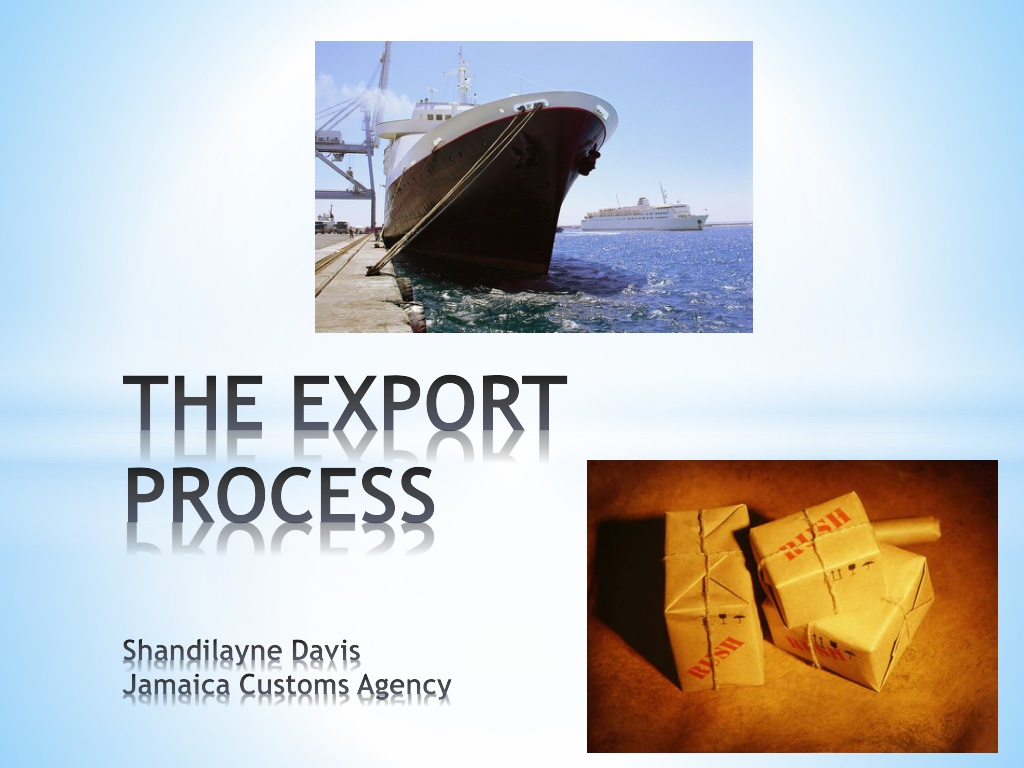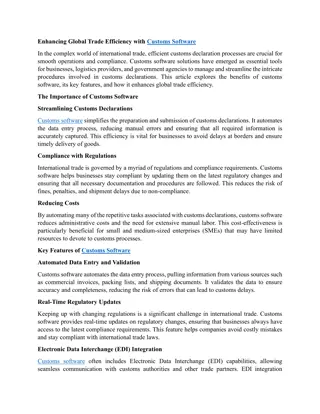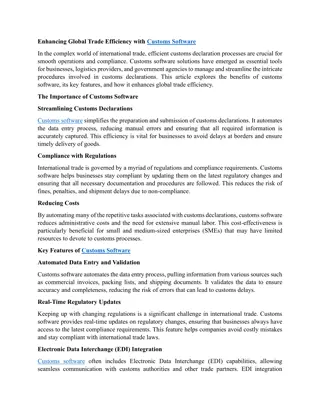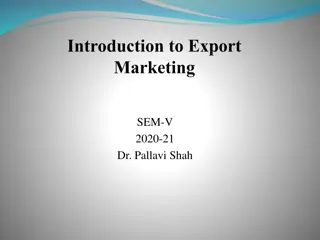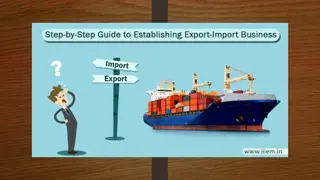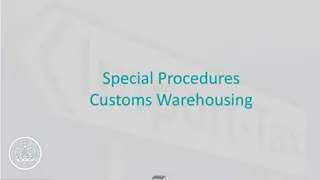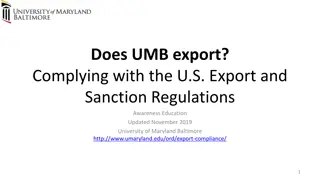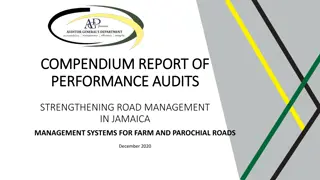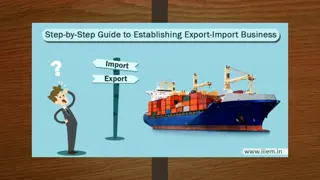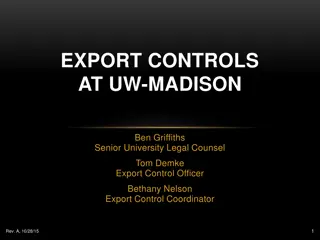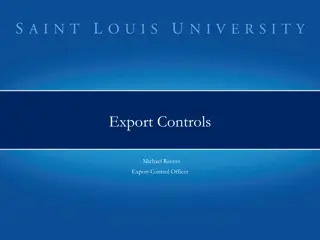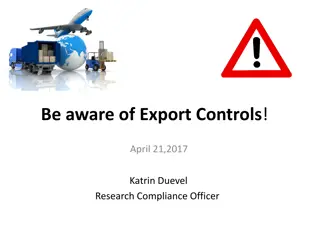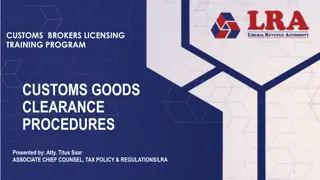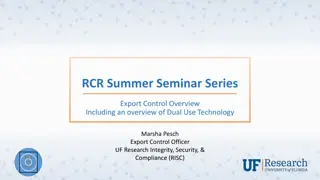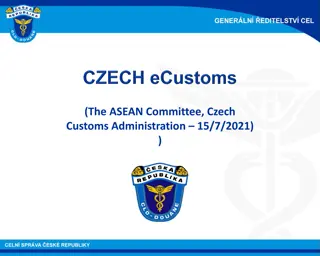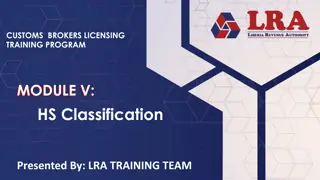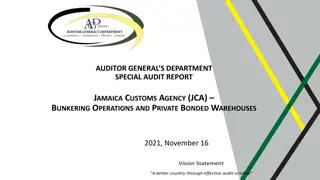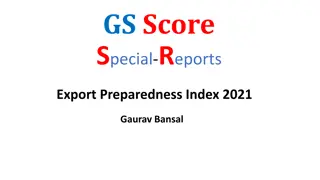Guide to Export Process and Customs in Jamaica
The export process in Jamaica, overseen by the Jamaica Customs Agency, involves applying to JAMPRO, border controls, examinations of export cargo, and compliance with Customs Act regulations. The outward movement of cargo is governed by specific sections of the Customs Act, covering restrictions, provisions, and notifications. Types of exports include domestic exports, temporary importations, and exportation for subsequent re-importation. Detailed steps for domestic exportation by sea and air are outlined, highlighting the necessary documentation, fees, and procedures. Compliance with Customs Act regulations, communication with enforcement units, and coordination with shipping companies are vital for a successful export operation.
Download Presentation

Please find below an Image/Link to download the presentation.
The content on the website is provided AS IS for your information and personal use only. It may not be sold, licensed, or shared on other websites without obtaining consent from the author. Download presentation by click this link. If you encounter any issues during the download, it is possible that the publisher has removed the file from their server.
E N D
Presentation Transcript
THE EXPORT PROCESS Shandilayne Davis Jamaica Customs Agency
The process begins with applying to JAMPRO to registered exporter commercial export become a Where to Begin?
*All items leaving the Island are subject to Border Controls as stipulated by the Customs Act and enforced by the JCA *No taxes are levied on exports *Intrusive examinations of export cargo are conducted based on risk assessment *All export cargo is subject to non intrusive examinations i.e. scanning at all Ports Things to Consider
Part V sections 133 -159 of the Customs Act governs the outward movement of cargo, baggage, ship stores, vessels and aircrafts. *Sec. 143 restrictions on the exportation of certain goods *Sec. 145 general provisions governing exports *Sec. 156 notification re short-loading of cargo Laws Governing Export
*Domestic Exports *Temporary Importations *Exportation for subsequent re-importation Types of Exports
*Complete booking with shipping company *Complete Export Entry (C87) *Complete Commercial Invoice (C23) *Contact JCA s Contraband Enforcement Unit 24hrs before loading the goods into the container *Complete Dock Receipt issued by shipping agent *Present dock receipt to wharf office (pay security fee) *Pay customs processing fee ($3005) *Submit completed entry form, dock receipt and other applicable documents to the export officer for processing. *Deliver cargo to wharf Exporting by Sea
*Complete customs entry, invoice, certificate / permit (where applicable), tally sheet and dispatch form. *Contact JCA s Contraband Enforcement Unit 24hrs before loading the goods into the container *Pay customs processing fee ($3005) *Present documents and goods to export officer for checking, signing and numbering. *Deliver cargo to the airline's warehouse *Present tally sheet along with dispatch form to the airline representative who will facilitate the entry of goods into the warehouse. *Some airline may require prior booking. Exporting by Air
Exportation may be approved for goods which were duty paid or intended for the local market under the following conditions: *Goods were intended for the local market and manifested accordingly *Authorization /approval is granted for exportation by the Collector of Customs
C25 - Temporary Importations
*Goods are imported without duty payment on the basis that: * They will be exported within 3 months or any such further period as the Commissioner of Customs may allow; * The duty is deposited or security given against exportation * Failure to export within the period dictated may result in the forfeiture of the deposit and where security was taken the duty must be paid.
C43 - Exportation for Subsequent Re- importation
The C43 facilitates the outward movement of goods that intend to return to the Island. Such as: *Goods exported for repair *Exhibitions *Temporary use abroad Such goods must bear distinguishing marks or features that will easily identifiable on re-importation.
*Commercial invoice *Dock receipt/Tally sheet *Permits/Licenses/Certificates *JAMPRO Letter (where applicable) *Certificate of Origin *EUR 1 *ICO *CIB *Excise Certificate *CITES Supporting Documents
*Trade Board Ltd *National Environmental Protection Agency *Ministry of Agriculture - Plant Quarantine Division - Veterinary Services Division - Fisheries Division *Ministry of Industry Investment & Commerce *Coffee Industry Board *Bureau of Standard Certifying Bodies
The Export system is an Internet based system, which facilitate preparation, validation This system automates the export process by allowing the brokers and exporters to lodge their entries via the Internet. interfaces with other trade agencies in order to verify exporter s details. export and entry processing. It registration E-Export - iCASE
EXPORT PROCESS FL0W DIAGRAM Invoice and Declaration Creation Brokers must register online to use Export System Exporters use same login from jExporter system Registration of Exporters, Consignee and Products Exporter/Broker create and save commercial invoices and declarations in workspace Application for License/certificate if required Apply for/Attach Supporting Document Trade Board Limited Approves application and notification sent to iCASE iCASE Based on the product being exported, the system will allow for the application permits. No supporting certification /license is required and/or already in possession Payment Declaration generated CNCRS Cashier Print Declaration for endorsement Jamaica Customs Enter locator #, collect fees and endorse declaration Customs Officer can now process the Export Entry Fail Resubmit Entry Pass
Exporter Registration System(jExporter) J-Exporter J-Exporter is an Internet based system, which facilitates exporter registration and processing. It integrates with other agencies that need to validate exporters before allowing further processing. Features and Functions Registration of consignee and products online. Validation of Taxpayer Registration Number Authorization letter requests Electronic Payment of Registration/Re-registration fees Real time transfer of information to trade agencies.
Integration with Other Trade Agencies Ministry Of Agriculture Ministry Of National Security Pesticide Control Authority Food Storage , Prevention & Infestation Environmental Health Ministry of Health Bureau of Standards
Benefits To Users 24 * 7 access to Government services. More alternatives for payment of taxes, licenses and other government fees. Greater business efficiencies and reduced bureaucracy for compliant exporters. Increased transparency in government operations. Reduction in processing time. Timely, accurate & convenient customer service. Ensures Security of sensitive business information. Expedites overall process of exporting goods.
Begins with the Exporter Border Control
It is also the mandate of every Customs Official: *The Export Officer who vets the Entry and Permits and examines the cargo *The Cargo Imaging Officer who scans the cargo prior to export *The Contraband Enforcement Team (CET) who will conduct further examinations as well as oversee the loading of cargo prior to arrival at the Port. Border Control
CET 923-7641/757-3912 BERTH XI 923-7018 ext. 360, 480 or 319 KINGSTON WHARVES 923-0415 NORMAN MANLEY INTERNATIONAL AIRPORT (AIR CARGO) 924-8084 CUSTOMS HOUSE (KINGSTON) 922-5140-9 MONTEGO FREEPORT 979-8126 SANGSTER INTERNATIONAL AIRPORT (AIR CARGO) 952-2537 MONTEGO BAY REVENUE CENTER (CUSTOMS) 952-0000 To notify of short loading in Kingston: exportmarinekgn@jacustoms.gov.jm www.jacustoms.gov.jm Contact Information
